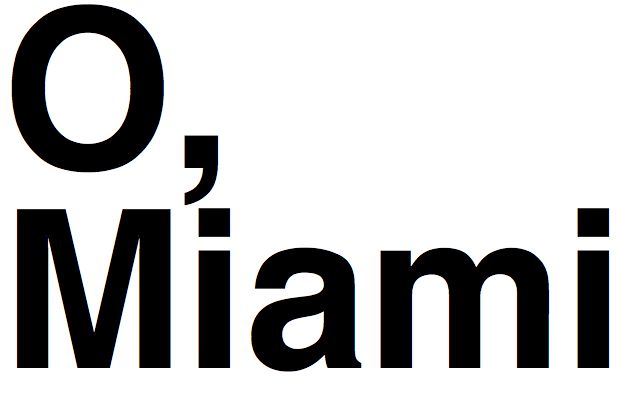
An Interview with P. Scott Cunningham About O, Miami
O, Miami is a county-wide poetry festival that will run during the month of April. Produced by the University of Wynwood and funded by the John S. and James L. Knight Foundation, O, Miami is a month-long series of events and traditional readings mixed with innovative poetry-in-public-places projects. The not so simple goal of the festival is for every person in Miami-Dade County to experience a poem. Events will be conducted in multiple languages, sometimes simultaneously, often in collaboration with other cultural organizations. O, Miami culminates in a four-day series of readings from April 27-30, 2011 at the Frank Gehry-designed New World Symphony Hall on Miami Beach.I spoke with P. Scott Cunningham, who is one of the many engines behind the project, about the nuts and bolts of putting O, Miami together plus his thoughts on the future of Miami’s literary community.
Neil de la Flor: O, Miami has an ambitious goal of reaching out and bringing a poem to 2.5 million Miami-Dade county residents during April, which is National Poetry Month. Why? What is it that makes poetry so vital to our daily lives?
P. Scott Cunningham: I’m not sure poetry is vital to our daily lives. Certainly aspects of it are: the inquisitiveness, the desire for meaning, etc., but poetry’s just like other art forms in that it enhances life; it doesn’t encompass it. From the beginning, poetry has had two functions: 1) to explain a people’s cosmology and 2) to provide pleasure. Before writing, these two functions were inextricable: in order to remember the entire history and belief system of your culture, the words had to have a pleasing pattern to them. Now that’s not always the case, but perhaps it should be! Why shouldn’t every poem attempt to explain the entire world to the listener? In any case, our goal is to provide pleasure to Miami-Dade County; not to replace the telephone lines or the sewer system.
ND: That would be nice, though. So, what’s the future of Miami-Dade’s literary community?
PSC:I hope we become a hub for poetry, and especially poetry in translation. Miami is such a polylingual town and a place where strange things seem to always be occurring. To me, that’s an ideal environment for poets. But we also need certain things to make the literary community stronger here, the most important being a better public transportation system. Look back in history and try to find a thriving literary community that wasn’t based on spontaneous pedestrian interaction. It doesn’t exist.
ND: I just had this same conversation with another writer a few months ago. I agree. We need a strong public transit system. Back to O, Miami, how was the project conceived?
PSC: In 2009, Alberto Ibargüen, President of Knight Foundation, spotted me typing poems on the street with the Miami Poetry Collective. After that, we had a meeting about what we could do to answer your second question—namely, how could we create a more vibrant literary scene here? We started with the University of Wynwood Visiting Poet Series (now in its third year) and that grew into the idea of doing an entire festival. I brought on Pete Borrebach to help me, and we came up with the concept over the period of several weeks with tremendous insight and influence from Tom Healy, Mitchell Kaplan, Dennis Scholl and Campbell McGrath. Basically, we started with the model of a traditional festival, which is that you create programming and then try to convince an audience to come to it, and since we weren’t sure that would work in Miami, we tried to do the opposite: bring the festival to the audience.
ND: The event will culminate in a four-day series of readings April 27th – 30th at the new New World Symphony Hall. Wow! What do you have to say for yourself?
PSC: I say, “Thank you New World!” Seriously, they’ve been great to work with and having some of our readings there is huge for us and our audience.
ND: For the everyday lover of poetry, tell us, what is a poem?
PSC: Well, it’s not just Robert Frost, which I think is most people’s conception of a poem. Rhyme, meter, nature imagery, etc are only some of the tools of the trade, not its defining features. So I’d say a poem to me is an attempt to produce pleasure and meaning from the strangeness of language. In other words, poetry lives in that space where language fails to do its job, or does it more spectacularly than you ever thought possible.
ND: Well said! I’m curious about the logistics of putting this event together. How did you manage all the moving parts, this symphony of writers, curators and far-flung venues?
PSC: Oh Neil, as someone who’s written about Oz, you should know that you never want to pull back the curtain. There’s no magic on this side; just a lot of emaciated graduate students subsisting on energy bar crumbs.
ND: What’s the next big project you’re working on?
PSC: The fall issue of Jai-Alai Magazine. Then O, Miami 2012.
ND: What will you do when O, Miami is over?
PSC: I’d like to pretend that I’ll be throwing myself into Rimbaudian abandon, but actually I’ll be doing a month’s work of paperwork. Like I said, it’s better on the other side of the curtain.
O, Miami runs throughtout the month of April and most events are free and open to the public. For a detailed schedule of events visit www.omiami.org.
Recent Content
-
Artsarticle ·
-
Artsarticle ·
-
Artsarticle ·

